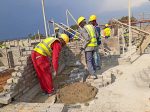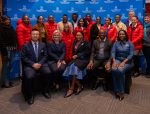Dr. Mokgweetsi Masisi, President of Botswana, has said that despite the warm relations between Namibia and Botswana, the two countries have yet to fully tap into their bilateral economic prospects.
Addressing delegates at the official opening of the Swakopmund International Trade Expo (SWAiTEX), Masisi highlighted that there exists significant potential for enhanced cooperation between Botswana and Namibia.
“Both countries have common strengths in areas such as animal disease control protocols, range management practices, abattoir and meat hygiene practices, and wildlife conservation strategies. Furthermore, both nations provide distinctive tourism experiences and are renowned for their sought-after wildlife safari offerings. By engaging in joint marketing efforts, our countries can extract more value from our tourism endeavours,” Masisi said.
He noted that moreover, the two countries have both ratified comparable regional agreements, specifically the Southern African Development Community (SADC) Free Trade Protocol and the Tripartite Free Trade Area (TFTA) Agreement, which spans the three regional economic communities of SADC, the Common Market for Eastern and Southern Africa (COMESA), and the East African Community (EAC).
These agreements aim to boost trade by establishing a substantial single market comprising approximately seven hundred million people (700 million) and boasting an estimated gross domestic product of well over US$1.4 trillion for our goods and services.
“This clearly illustrates the common ground we share in terms of global integration initiatives.” Masisi further said, adding that currently, bilateral trade primarily revolves around the exchange of diamonds.
“In the year 2023, Botswana imported goods valued at four hundred and seventy-three million United States dollars (US$473 million), with diamonds comprising ninety-three percent (93%) of this total. Besides diamonds, Botswana also exports commodities such as cement, electrical energy, cement clinker, and pasta to Namibia.
“Namibia has been procuring livestock vaccines from the Botswana Vaccine Institute (BVI) to manage trans-boundary animal diseases like foot and mouth disease and cattle lung disease. This collaboration offers us the opportunity to conduct coordinated foot and mouth vaccination campaigns and to ensure ongoing surveillance of foot and mouth disease in both countries,” he said.
On the other hand, in 2023, Botswana exported to Namibia goods worth sixty-point-nine million US dollars (US$60.9 million). Diamond exports constituted forty-eight percent (48%) of this total, with coal and electrical cables making up 10% and 5%, respectively. Additional notable exports from Botswana to Namibia encompass passenger vehicles and fibre-optic cables.
“It is imperative for governments to uphold their responsibility in fostering trade and investment by establishing an environment that enables the private sector to flourish. On a bilateral scale, the Trans-Kalahari Railway Line stands out as a crucial project that demands robust pursuit to enhance the transportation of goods between our two nations and the broader SADC region,” Masisi said.
Notably, the collaborative efforts between Botswana and Namibia to enhance infrastructure connecting the two nations, thereby ensuring seamless movement of goods, services, and people, are ongoing.
“It is with pleasure that I announce the agreement to establish a one-stop border post in Mamuno, reflecting the advancement of negotiations on the draft agreement for the one-stop border post. This progress follows Namibia’s enactment of the One-Stop Border Posts Act, underscoring our commitment to streamlining border processes for increased efficiency.
“Another potential area for collaboration exists in the energy sector, where Botswana Oil Company has initiated discussions with the Namibian National Petroleum Corporation to explore possibilities for cooperation in establishing shared fuel storage facilities in Walvis Bay. Additionally, discussions include joint efforts for fuel transportation and coordinated approaches to sourcing oil from Angola. This demonstrates a promising avenue for partnership in the energy domain between our two countries,” Masisi said.










